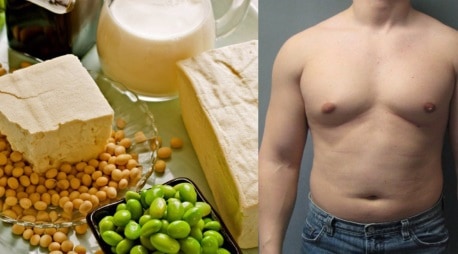Soy And Testosterone: Myths And Half Truths
Fact Checked On: 5-3-2018 By: Rob MillerContents
What is Soy
Health Benefits of Soy
Clinical Studies of Soy and Testosterone
Does Soy Decrease Testosterone
Frequently Asked Questions
Soy and Testosterone – The Bottom Line
Soy gets pummeled by bodybuilding magazines and celebrated in women’s health magazines. It’s a super food one day and a carcinogen the next.
What’s actually going on with soy?
Are all the rumors true?
Can it destroy your testosterone levels?
Or is this just an exaggeration?
Let’s take a look at what soy is and the science behind soy and your testosterone levels.

What is Soy?
Well it depends on who you are asking. The universal definition of soy is that it’s a legume. The vast differences occur depending on where it’s grown. Many Asian countries with a focus on Japan grow soy and allow it to ferment. This process helps to improve the nutrient quality of soy while reducing its estrogenic properties.
In the United States, it’s a much different story. The U.S.-based soy is a chemically processed Frankenstein’s monster of what they have East. In fact, many countries outside of the U.S. refuse to buy or trade U.S.-based soy due to the quality of production and the high levels of pesticides and herbicides contained within. We don’t even have to get into the fact that U.S.-based soy is a GMO (genetically modified organism).
Health Benefits of Soy
When grown and prepared properly, soy does have quite the nutritional punch. Let’s assume that we are talking about natto, a traditional Japanese side dish that is served with most meals.
Very Nutritious
- Fermented soy is quite nutritious in moderate amounts. It’s loaded with vitamins, minerals, healthy fats, and protein. Best of all, it’s a probiotic food. Watch out though. Fermented soy is packed with far more polyunsaturated fats than monounsaturated fats. People from the U.S. already get plenty of PUFAs in their diets.
Gut Health and Digestion
- Continuing with the idea above, the strain of probiotic that is prevalent in fermented soy has been shown to significantly promote gut health and proper digestion. It may also help to alleviate common stomach-based complications such as inflammation.
May Prevent Disease
- The primary reason that you see soy as a celebrated health food is the link between soy and a decreased risk of certain diseases, namely cardiovascular disease and breast cancer. Researchers point to the high levels of isoflavones as the primary factor for decreasing the risk for disease.
Clinical Studies of Soy and Testosterone
The Issue with Equol
- One study that is often cited points to how increased consumption of soy leads to a greater concentration of equol among stomach bacteria. The study shows that equol effectively binds to and deactivates dihydrotestosterone (DHT). DHT is NOT the same as testosterone. DHT is a very anabolic and androgenic hormone; however, it’s also connected with prostate cancer and male pattern baldness. The question is this: If DHT is deactivated but testosterone is left unchecked, is this really a bad thing? (4)
Soy and Sperm Count
- Another study that is often used as evidence against soy consumption demonstrates that soy-based diets correlate to lower sperm count. Testosterone is a key component in the production of sperm in the body. A lower sperm count on account of soy may have direct implications that low testosterone levels are to follow but the study didn’t expressly say this. (5)
Soy and Total Testosterone
- In a study published in the Journal of Nutrition, researchers discovered that the use of soy protein isolates did decrease the testosterone and DHT levels of the young men taking it. This has huge implications as soy protein isolates are used in many of today’s most popular supplements. (6)
Does Soy Decrease Testosterone?
Given the amount of evidence out there, I think it’s safe to say that the consumption of soy can have a direct impact on hormonal levels. With that said, I believe it’s the type of soy you’re eating that will make or break those impacts.
If you’re eating naturally fermented and produced soy, such as natto, then you should be able to safely consume a modest amount to reap its health benefits. This is especially true for guys who may be on the road to prostate issues.
If you’re consuming the U.S.-based soy, then you’re definitely in for trouble. Over 90% of the soy grown in the U.S. is considered GMO. What’s more, unfermented soy is high in anti-nutrients and phytoestrogens; neither of which has been shown to be friendly toward your testosterone levels.
Frequently Asked Questions
If I eat soy, what type of soy should I buy?
- Eat small amounts of fermented soy such as natto or tempeh.
Can I use soy protein and still see muscle gains?
- Given the evidence, I would not recommend using soy protein for muscle building goals. You don’t need to use whey, casein, or egg but don’t use soy. There are far better plant-based protein options out there for you. Personally, I’d recommend a pumpkin seed-based protein. You can also use a mix of rice, pea, and cranberry protein.
What are the side effects of eating soy?
- Nausea
- Inflammation
- Interferes with nutrient absorption
- Digestion issues
How does soy affect men compared to women?
- For men, consuming soy may result in lower testosterone levels, mood swings, fatigue, gyno-based symptoms such as man-boobs, and weight gain. For women, there seems to be a correlation between unfermented soy and breast cancer. Babies are also at risk while in the womb and during feeding. Soy has been shown to cause developmental issues in the womb while experts agree it is not an appropriate source of nutrition for a newborn.
Soy and Testosterone – The Bottom Line
Overall, if you’re considering adding soy into your diet and you live in the United States, think again. U.S.-based, unfermented, and overly processed soy will have a direct impact on your levels of testosterone and DHT, effectively lowering both. This is especially true for those guys who are looking to build muscle. Stay far away from soy-based protein. Stick with whey, egg, or pumpkin seed protein powder.
If you want to incorporate more plants into your diet, that’s great but choose one that will boost your testosterone levels and stay away from soy.
References
- http://nutritiondata.self.com/facts/legumes-and-legume-products/4380/2
- Selvam R, Maheswari P, Kavitha P, Ravichandran M, Sas B, Ramchand CN. Effect of Bacillus subtilis PB6, a natural probiotic on colon mucosal inflammation and plasma cytokines levels in inflammatory bowel disease. Indian J Biochem Biophys. 2009 Feb;46(1):79-85.
- Messina M. Soy and Health Update: Evaluation of the Clinical and Epidemiologic Literature. Nutrients. 2016;8(12):754. doi:10.3390/nu8120754.
- Miyanaga N, Akaza H, Takashima N, Nagata Y, Sonoda T, Mori M, Naito S, Hirao Y, Tsukamoto T, Fujioka T. Higher consumption of green tea may enhance equol production. Asian Pac J Cancer Prev. 2003 Aug-Dec;4(4):297-301.
- Chavarro JE, Toth TL, Sadio SM, Hauser R. Soy food and isoflavone intake in relation to semen quality parameters among men from an infertility clinic. Hum Reprod. 2008 Nov;23(11):2584-90. doi: 10.1093/humrep/den243. Epub 2008 Jul 23.
- Dillingham BL, McVeigh BL, Lampe JW, Duncan AM. Soy protein isolates of varying isoflavone content exert minor effects on serum reproductive hormones in healthy young men. J Nutr. 2005 Mar;135(3):584-91.




